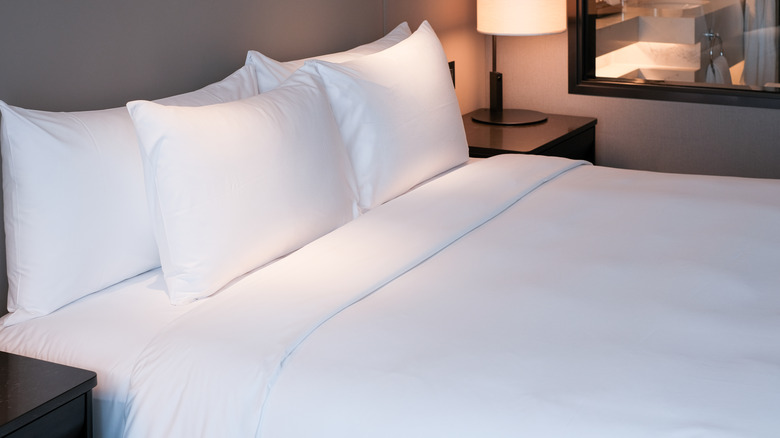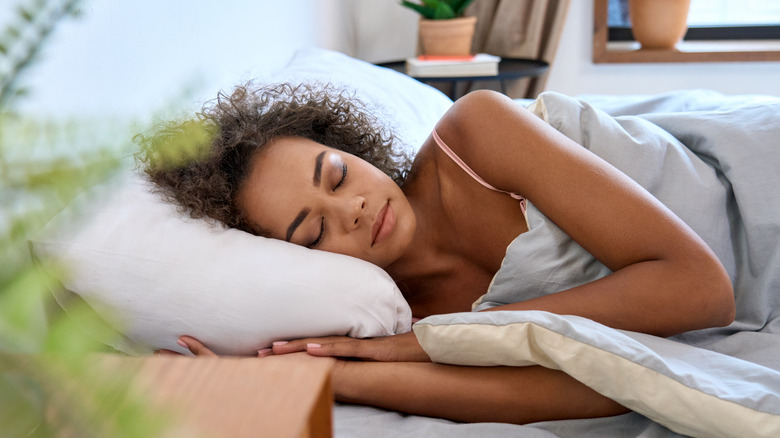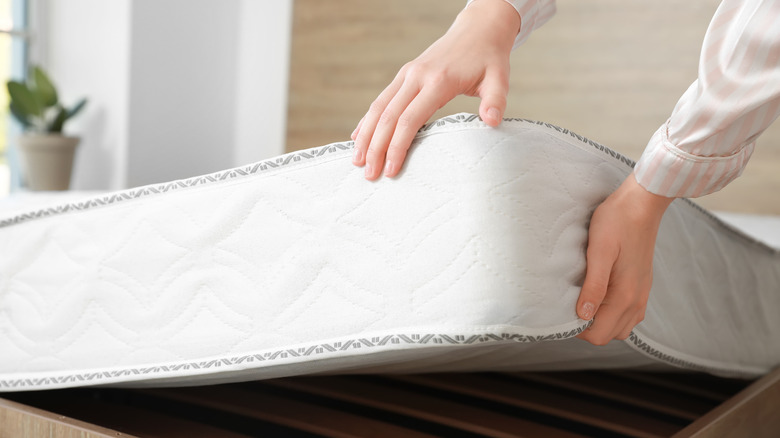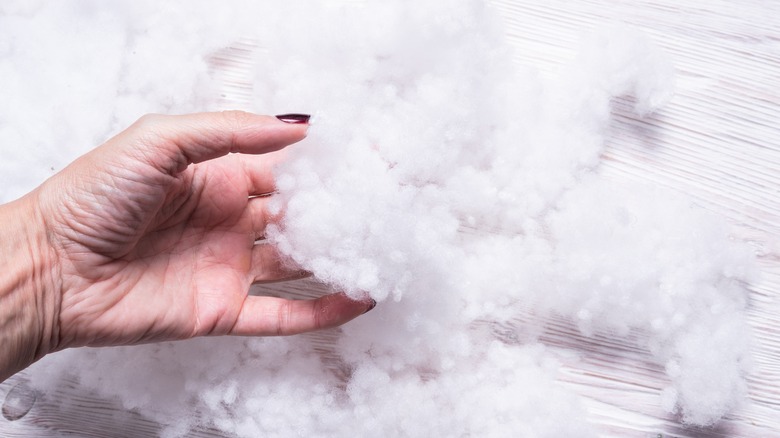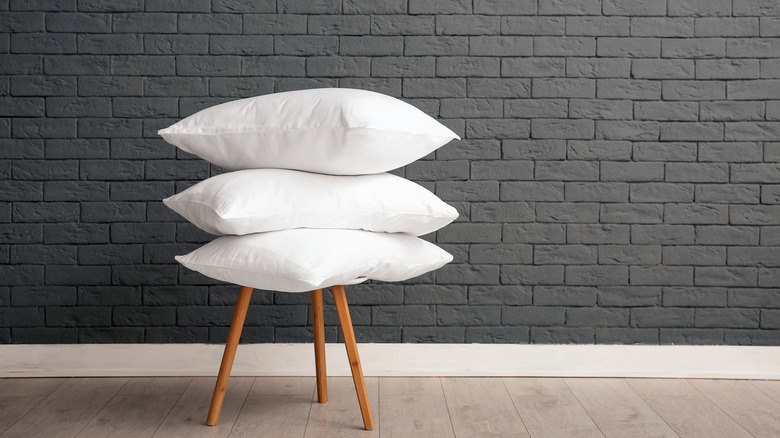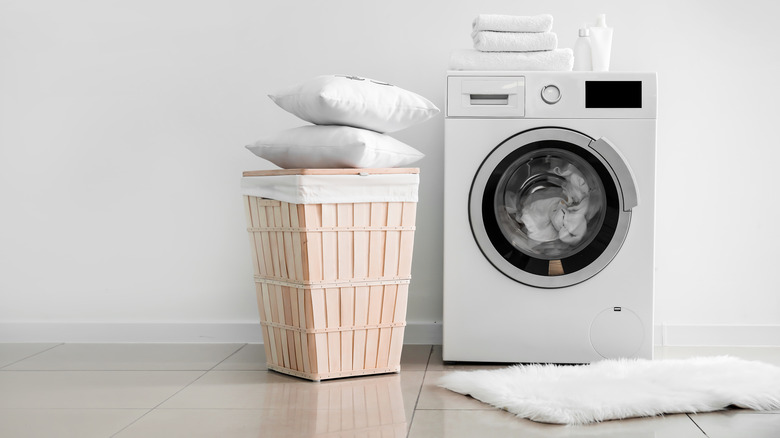Things To Consider When Picking Pillows For Your Bed
Whether you're a sound sleeper who never has trouble dozing off or the type who finds yourself awake at all hours of the night tossing and turning, every one of us spends a significant amount of time in bed. In fact, according to Dreams, the average human spends about 26 years sleeping over the course of their life. Given how much time you're spending curled up in it, you want to ensure that every component of your bed is just right for you.
Many focus on selecting the right mattress, which can make a big difference. Whether you want something firm or soft, you want to find the right mattress for your sleeping style. However, don't overlook the importance of the right pillows. Since pillows typically don't require the same financial investment as a mattress, you might assume that any pillow will do the job just fine, but that's not the case. Your pillows can help you sleep better, and it's critical that you choose the right kind for you.
As Clearwater Chiropractic outlines, pillows not only make sleep a lot more comfortable than if you laid your head directly on the mattress, but they also play the essential role of supporting your neck and back. And the Sleep Foundation recommends replacing your pillows every one or two years, so if it's been longer, it may be time to do a little shopping. Here are five key things to consider when buying new pillows.
Your typical sleep position
While your sleep position may vary occasionally, most of us have a specific position that's our go-to for a good night's rest. Perhaps you can't fall asleep any way besides lying on your side, or perhaps you're strictly a snoozing-on-your-back kind of person. Whatever your predominant sleep position is, you want to keep it in mind when buying a pillow.
For example, as Spine Health explains, people who sleep on their back may want a pillow that's a little bit lower. A ton of height on your pillow could impact how your spine is supported in that position. On the other end of the spectrum, thicker pillows are the ideal choice for those who sleep on their side, as these will keep your head supported and in line with your spine while you're sleeping. Finally, for those who sleep on their stomach, you want an even flatter pillow than would be appropriate for back sleepers, according to Cornerstone Physiotherapy.
Depending on your preferred sleep position, you may want to consider an extra pillow or two for areas of your body beyond your head. For example, individuals who sleep on their back may benefit from a pillow beneath their knees, while side sleepers may want one between the knees, both to help with proper spinal positioning.
The mattress you're pairing it with
Your pillows and your mattress aren't two separate entities. You're using your pillows while lying atop your mattress, so it only makes sense that the two would work together. However, this means that you'll want to keep your mattress in mind when picking out your perfect pillows because it does have an impact.
As Casper outlines, a general rule of thumb is that if you have a firmer mattress, you should opt for a pillow with a bit more height and fluff, while those with a softer mattress should go for a lower pillow. This is because, with a softer mattress, you sink into it a little bit, and a very high pillow might lead to an uncomfortable alignment issue as your body sinks into the mattress, but your head stays much further up in the air due to the high pillow's loft.
Another consideration, as Plank by Brooklyn Bedding explains, is that many who favor a firm mattress tend to be either stomach or back sleepers. For both these populations, a lower pillow is typically the better choice. And, if you're not quite sure what category your mattress would fall into, you may want to try an adjustable fill pillow. My Slumber Yard explains that these are pillows where you can remove portions of the filling until you get your perfect height.
The filling within
While pillow filling options may have been limited decades ago, nowadays, there are many choices with all kinds of high-tech tweaks designed to help you get the perfect night's sleep. And it can be tough to decide which is the right fit for you amongst all the available types.
As Hullo Pillow outlines, classic down pillows may be a great fit for those who want something very moldable to their head, as those light pieces of down can easily move throughout the pillow. They're also quite durable and sustainable and a solid choice for sleepers who prefer something a bit softer. Feather-filled pillows have similar pros, although they're a little less soft (and a little less expensive) than down.
Budget-conscious shoppers may be drawn to polyester fiberfill because it's very cheap and a common option, making it quite accessible. However, those fibers can start to clump rather quickly, leading to an undesirably lumpy pillow.
For those who want something with a particular shape to deal with alignment issues, Nectar Sleep recommends memory foam filling. Finally, those willing to look outside the box may want to consider alternatives like buckwheat hull filling, wool filling, latex filling, or microbead filling. Each has its own pros and cons.
Ultimately, the best way to decide on the perfect pillow filling is to identify which traits you prize most, whether that's breathability, malleability, durability, etc., and find the material that aligns best with those needs.
The size
Once you've considered key details like the mattress you have, the type of sleep position you favor, and the filling that best suits your needs, there's one more key consideration for the type of pillow to get — the size. While you may have thought there was only one option because the standard size is so common, you can actually choose between standard, queen, king, and body, as Early Bird by Amerisleep explains.
Again, your preferred sleep position is one of the main things you want to keep in mind when deciding on size. As Sleep Foundation outlines, standard-size pillows are best suited for stomach sleepers. The slightly larger queen-size option is good for those who toss and turn frequently, as the extra surface area lowers your chances of rolling your head off the pillow and leaving it unsupported as you sleep. Finally, king-size options are perfect for back sleepers, as there's much more surface area for your shoulders to lay where you need them.
Side sleepers are a bit unique in that several options would work, depending on a few quirks. Those who switch sides a lot would do best with queen size, as they'd be considered somewhat restless sleepers. And, since side sleepers often need a bit of a higher pillow, sometimes king size can be a good choice because it offers a little more volume.
How to care for it
Finally, one of the last factors to keep in mind when buying pillows is the ease with which you can care for them. Sure, some people might replace all the pillows in their homes annually. However, many try to prolong the life of their pillows when possible, and certain pillows make this a little easier than others. This is especially important if you struggle with respiratory issues like asthma and want to wash your pillows regularly.
For example, as per Nectar Sleep, polyester fiberfill pillows can quite easily be laundered in a washing machine, making them an excellent option for those who need to wash their pillows frequently. In fact, according to Martha Stewart, several options, including cotton, feather, and down can typically be cleaned on a gentle cycle in a regular washing machine.
You run into issues with pillows with a particular shape, such as memory foam options. That's because a washing machine could potentially break up the shape of the pillow, which is the major reason behind its appeal.
So, while you can spot-treat pillows and clean the exteriors, if you like to refresh your pillows by washing them once every couple of months, be mindful of which pillows aren't suited to that treatment. Adding a dry cleaning bill into the equation, even once or twice a year may dissuade you from particular types of pillows.
